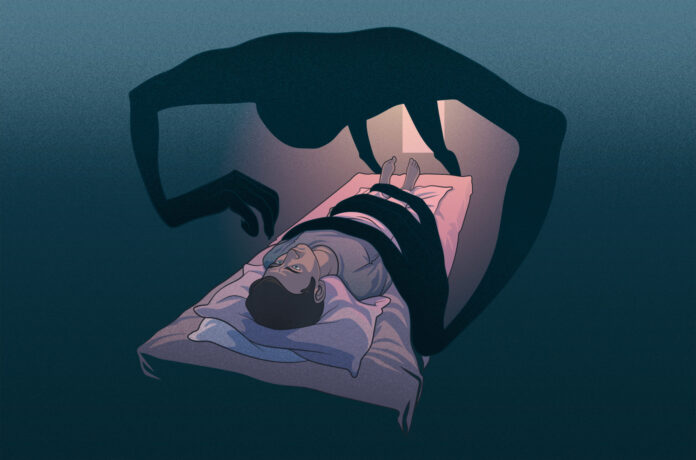Have you ever experienced waking up from sleep but being unable to move your body? – That state of mind and body is called sleep paralysis.
It is a perplexing phenomenon between sleep and wakefulness in which our mind is awake but our body refuses to function. It occurs during the REM (rapid eye movement) period, in which the brain is fully functional and the person gains consciousness, but the body does not compile with the instructions.
How Does It Happen?
At night, our bodies alternated between REM and non-REM periods. InREM period, the brain is working, and some vivid dreams can be seen. Also in the REM period, our body experiences muscle atonia, in which muscles are paralyzed. It happens to prevent us from acting out our dreams.
Sleep paralysis occurs when the muscle paralysis persists beyond the REM stage into wakefulness. At this time, the person becomes conscious but is unable to move or talk.
Prevalence Of Sleep Paralysis
Nowadays, it’s increasingly common to see individuals experiencing sleep paralysis. Research shows that approximately 7.6% to 38% of the general population experiences sleep paralysis at least once in their lifetime.
And sleep paralysis is not only confined to adults. It affects the pediatric population equally. Research indicates that the prevalence of sleep paralysis in children ranges from 7% to 40%.
What Happens In Sleep Paralysis?
The person remains confined to the bed, and all its struggles have gone in vain. It creates a feeling of anxiety and stress in the body. Along with that, he experienced many things during sleep paralysis, like:
1. Inability to Move or Speak:
In sleep paralysis, a person tries to make others aware of his condition, but it is of no use. As The hallmark symptom of sleep paralysis is the temporary inability to move or speak, despite being conscious.
2. Feeling of Pressure or Weight on the Chest:
Many people experience weight on their chests in sleep paralysis. It feels as if something is pressing down on them. If the person does not relax his mind during sleep paralysis, this situation can lead to panic attack initiation.
3. Hallucinations:
Hallucinations worsen the sleep paralysis. You can feel people’s touch, hear their voices, and see their shadows in sleep paralysis. But it is not real, even though your mind hallucinates it.
4. Sense of Fear or Dread:
You cannot move, speak, or see hallucinations; these things automatically trigger your mind and create a feeling of fear and dread.
5. Difficulty Breathing:
People’s experiences vary with sleep paralysis. Even it is found that some people experience difficulty breathing during sleep paralysis, leading to a shock condition.
6. Sense of Presence:
Your sense of illusion will trigger it and make you feel like you are surrounded by someone. In sleep paralysis, you experience the presence of those people you fear the most.
Causes of Sleep Paralysis
How do you feel when sleep time gives you anxiety and panic instead of relaxation?
Truly, you will avoid sleeping as much as you can. Let’s delve into the causes of sleep paralysis so that you can prevent it and enjoy a peaceful sleep time.
1. Disrupted Sleep Patterns:
In our youth, which thing is most common?
Disrupted sleep schedule. We lack time management skills, and in return, we have to sacrifice our sleep to complete our work. The consequence of this disturbed pattern is sleep paralysis. The more you counter the natural wake-sleep cycle, the more episodes of sleep paralysis you will experience.
Read More: The Top 7 Uncomplicated Ways to Enhance Sleep Quality
2. Stress And Anxiety:
Overthinking, stress, anxiety, and depression are ruining people’s sleep quality. It disturbs people’s sleep schedule as stress implies difficulty for a person in falling asleep, along with many awakenings throughout the night. All these situations increase the chance of sleep paralysis.
3. Sleep Disorders:
Sleep paralysis may occur due to a health condition like Certain sleep disorders, such as narcolepsy and obstructive sleep apnea, are associated with an increased risk of sleep paralysis.
4. Sleeping Position:
Sleeping posture determines how our day will go the next day.
Because wrong posture means back pain, muscle stiffness, and body pain. Along with that, the wrong posture also disrupts your sleep time through sleep paralysis.
Read More: Six Reasons: Why Is Yoga Compulsory in Your Daily Routine?
5. Genetic Factors:
Genetic predispositions may also play a role in the susceptibility to sleep paralysis. The neurotransmitter that controls the REM cycle may vary and cause sleep paralysis. Also, reducing the level of sleep regulating hormones, i.e., serotonin and dopamine, may initiate sleep paralysis in an individual.
Conclusion
Sleep paralysis may feel less severe, but its impact can only be understood by those who experience it. It affects a person’s mental health. Thus, study down the psychology and causes behind sleep paralysis and get rid of it.


